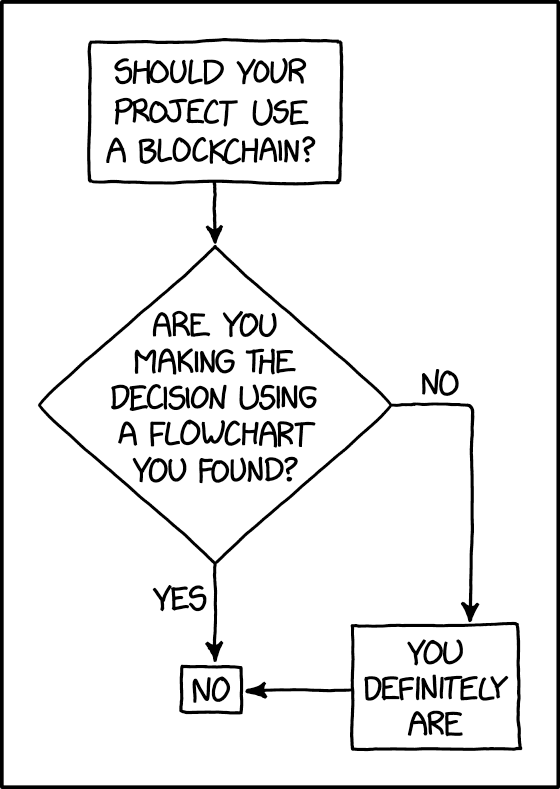Blockchain

So What is Blockchain?
It's basically Git
Here are the similaries between the two.
| Git | Blockchain |
|---|---|
| Linked List, history of commits | Linked list, chain of blocks |
| Each commit has a hash of its contents | Each block has a hash of its contents |
| Commit points to parent | Block points to parent |
| History is append only | Chain is append only |
| Use merkle tree to store blobs (files / data) | Use merkle tree to store transactions |
| Distributed to anyone who clones it | Distributed to anyone that runs the node software |
| Verifed using commit hashes | Verified using block hashes |
However there are some key important differences.
| Git | Blockchain |
|---|---|
| Anyone can rewrite history | No one can rewrite history |
| No global agreement needed | Global consensus mechanism (proof of work (PoW), proof of stake (PoS), etc) |
| No economic incentive | Economic incentives for mining, or having a node |
| Rely's on trust and who you add as a collaborator | Trust only the code and consensus mechanism |
Ok but how does it work?
Blockadelphia
There are a few steps to any blockchain, and they all work with the same underlying principles and use the same general logic loop.
- Submit transaction
- Transaction propagate across the network and get added to mempools of participating nodes.
- When enough transactions have accumulated or time threshold passed, a new block is proposed by a validator.
- Network uses PoW or PoS consensus algorithm to determine which validator proposes the next block.
- One node wins or is selected, broadcasts the block to the network, and all nodes validate and update their chain. The process then repeats.
What's the problem here?
Problems Schmablems
- Massive Energy Consumption: Proof of Work relies on miners solving cryptographic puzzles using tons of electricity.
- Scalability (PoW): Bitcoin processes about 7 transactions per second. That's... not ideal for global money.
- Store of Value: “Digital Gold” sounds nice, but it’s volatile, rarely used for payments, and still largely driven by speculation.
- User Unfriendly: Ain't no way Grandma is using this
- Pay to Play (PoS): Proof of stake comes from stake, stake comes from a lot of money.
- Genesis Tokens: Many chains give early insiders and developers large amount of token supply.
What's the Silver Lining
There's gotta be something... Right?
I still think it's an awesome project and an interesting idea. When I first started studing and learning about blockchain I really thought it might be revolutionary. I think though after being battle tested against the constraints of the real world, the idealism of the technology has faded and what remains simply is its just not as world changing of a technology as we're led to believe. It still has it's use for niche worldwide transactions but for the most part I think the XKCD comic sums it up rather nicely.
XKCD Flavor text: Blockchains are like grappling hooks, in that it's extremely cool when you encounter a problem for which they're the right solution, but it happens way too rarely in real life.
